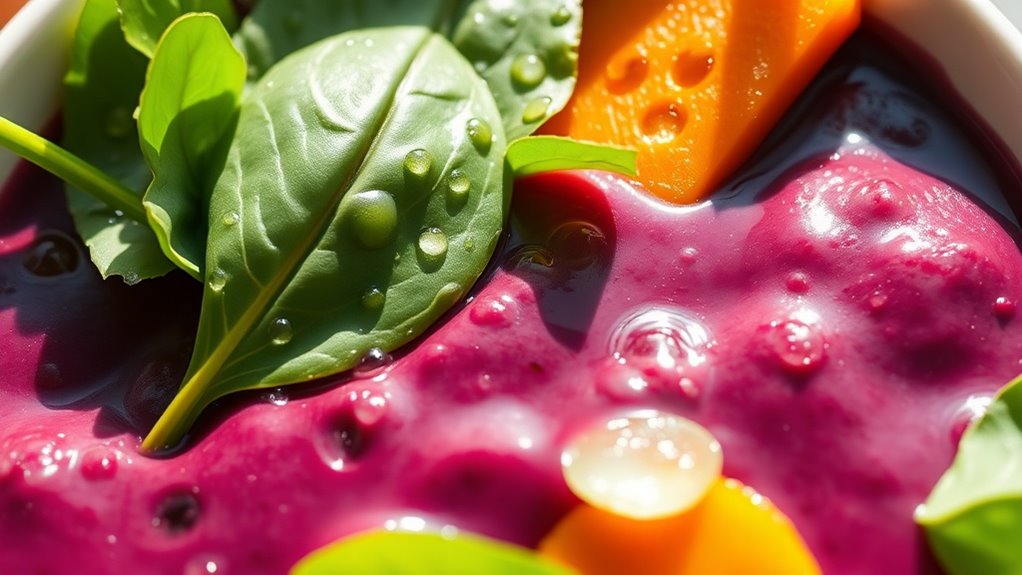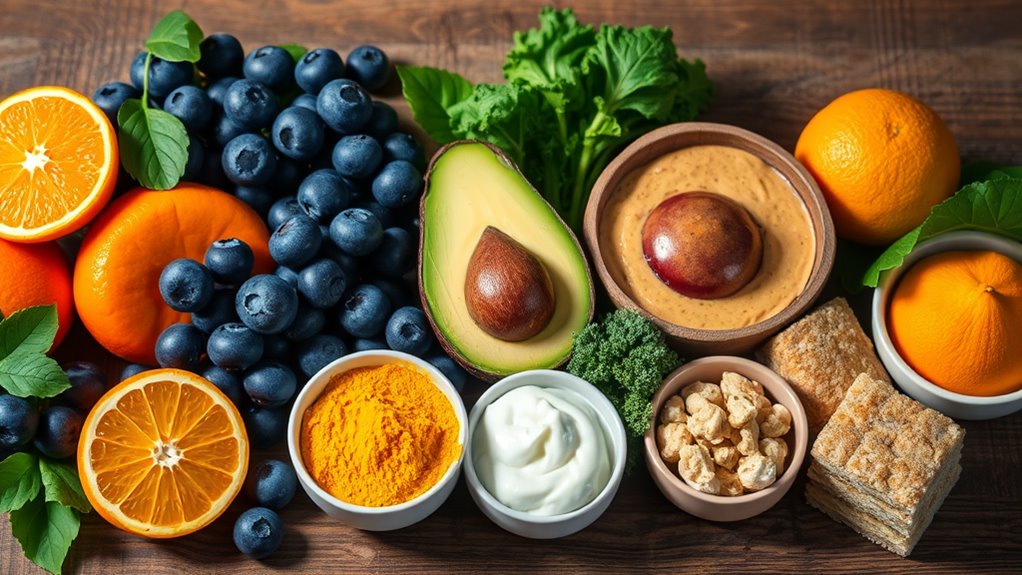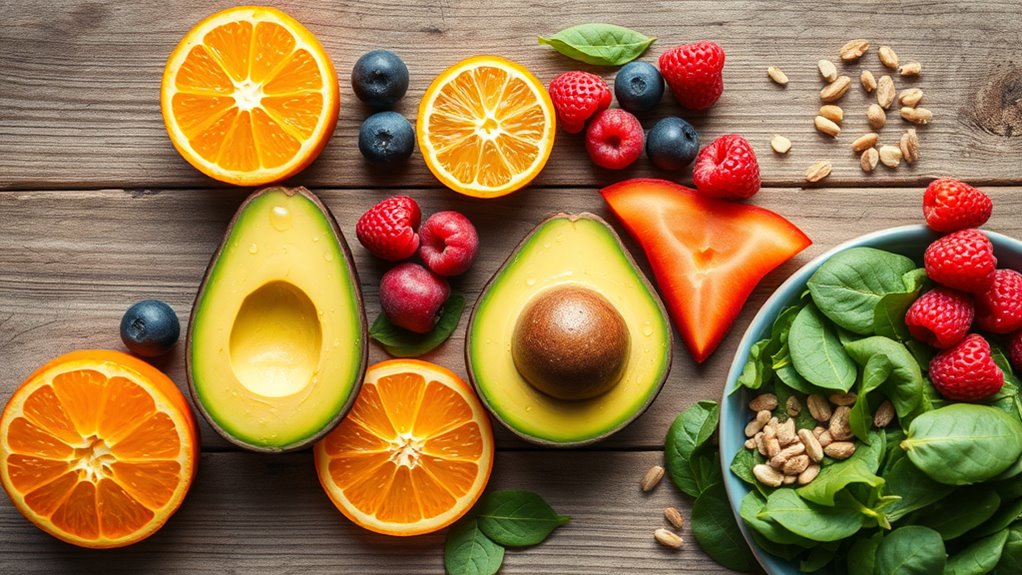This One Food Can Calm Redness and Inflammation in Skin
Imagine your skin as a canvas, where inflammation and redness act as unwelcome smudges. One powerful food can help restore balance and clarity. This natural remedy, packed with beneficial compounds, has been shown to significantly reduce irritation and promote an even complexion. As you consider incorporating this food into your daily routine, you’ll discover how its unique properties can transform your skin health and enhance your overall well-being.
Key Takeaways
- Turmeric, known for its curcumin content, effectively reduces skin redness and inflammation at the cellular level.
- Curcumin inhibits inflammatory pathways and decreases pro-inflammatory cytokine production, calming irritated skin.
- The antioxidant properties of turmeric neutralize free radicals, helping to alleviate irritation and promote a clearer complexion.
- Incorporating turmeric into your diet can enhance overall skin health and appearance, making it a powerful anti-inflammatory food.
- Adding turmeric to smoothies, soups, or golden milk can boost skin vitality while providing anti-inflammatory benefits.
The Role of Inflammation in Skin Health
Inflammation plays a crucial role in skin health, acting as the body’s natural response to injury and irritation.
While it’s essential for healing, chronic inflammation can lead to skin issues like redness and sensitivity.
You can help manage this by incorporating anti-inflammatory foods for skin into your diet.
Foods rich in antioxidants, omega-3 fatty acids, and vitamins can mitigate inflammation.
For instance, berries, fatty fish, and leafy greens are excellent choices. Additionally, maintaining a diet rich in essential foods for skin health can support overall skin vitality.
Introducing the Anti-Inflammatory Food
What if you could combat skin redness and inflammation simply by adjusting your diet?
Introducing turmeric, a powerful anti-inflammatory food that’s gaining attention in skin health discussions.
This vibrant spice contains curcumin, known for its ability to reduce inflammation at the cellular level.
Curcumin, found in vibrant turmeric, has remarkable properties to reduce inflammation at the cellular level.
By incorporating turmeric into your meals, you can potentially ease skin irritation and promote a clearer complexion.
Research supports its role in managing inflammatory conditions, making it a valuable addition to your dietary arsenal. Additionally, nutrient-rich foods high in antioxidants can further enhance your skin’s health and glow.
Simple changes, like adding turmeric to smoothies or soups, can lead to noticeable improvements in your skin’s appearance and overall health.
Nutritional Profile and Benefits for Skin
Turmeric’s impressive nutritional profile makes it a standout choice for promoting skin health.
This golden spice is rich in essential compounds that can nourish your skin.
Consider the following benefits:
-
Curcumin: A powerful antioxidant that fights free radicals.
-
Vitamins: Packed with vitamins C and E, which support collagen production.
-
Minerals: Contains iron and potassium, essential for skin vitality.
-
Anti-inflammatory compounds: Help soothe irritated skin and promote an even tone.
Incorporating turmeric into your diet or skincare routine can provide these vital nutrients, enhancing your skin’s overall health and appearance. Additionally, nutrient-rich foods like turmeric are an essential part of a balanced diet for achieving a radiant glow.
How This Food Reduces Redness and Inflammation
How can a simple spice like turmeric significantly combat skin redness and inflammation?
Turmeric contains curcumin, a potent anti-inflammatory compound that works by inhibiting inflammatory pathways in your body. This action reduces the production of pro-inflammatory cytokines, effectively calming your skin. Additionally, turmeric’s antioxidant properties help neutralize free radicals, which can exacerbate skin irritation. Research shows that applying turmeric topically or consuming it can improve skin conditions like acne and eczema. Moreover, incorporating turmeric into your diet can provide soothing solutions for sensitive skin, enhancing your overall skin health.
Ways to Incorporate This Food Into Your Diet
Incorporating turmeric into your diet can be both simple and delicious.
Incorporating turmeric into your meals is an easy and tasty way to boost your health.
Here are some easy ways to enjoy its benefits:
-
Golden milk: Whisk turmeric into warm milk or a milk alternative with honey for a soothing drink.
-
Smoothies: Blend a teaspoon of turmeric into your favorite smoothie for a vibrant color and health boost.
-
Soups and stews: Add turmeric to soups or stews for an earthy flavor and anti-inflammatory properties.
-
Seasoned rice: Stir it into cooking rice or quinoa for a colorful and nutritious side dish.
These options not only enhance flavor but also support your skin health effectively. Additionally, turmeric contains key nutrients that are known to promote clear skin and combat inflammation.
Additional Tips for Maintaining Healthy Skin
Alongside incorporating turmeric into your diet, maintaining healthy skin involves a holistic approach that encompasses various lifestyle habits.
Stay hydrated by drinking plenty of water, as it helps flush out toxins and keeps your skin supple.
Protect your skin from UV damage by using sunscreen daily. Regularly applying sunscreen daily is essential for safeguarding against harmful UV rays and preventing premature aging.
A balanced diet rich in antioxidants, vitamins, and healthy fats can further support skin health.
Regular exercise enhances circulation, promoting nutrient delivery to skin cells.
Lastly, establish a consistent skincare routine that includes gentle cleansing and moisturizing.
Prioritizing quality sleep also rejuvenates your skin, allowing it to repair and regenerate effectively.




